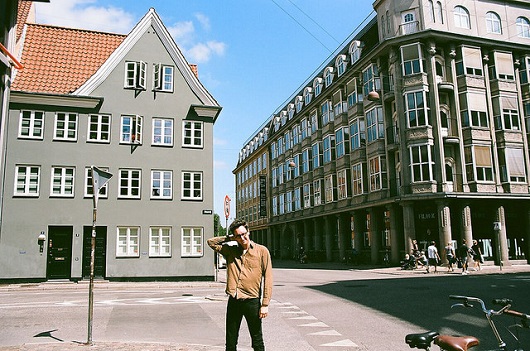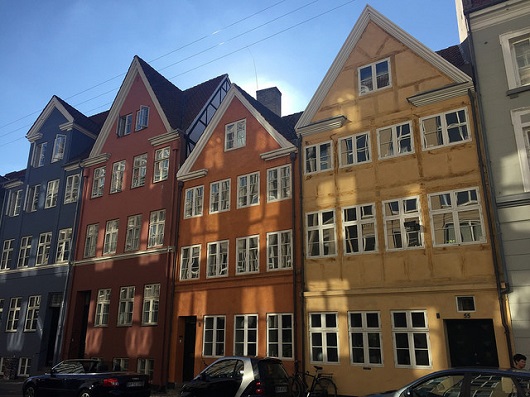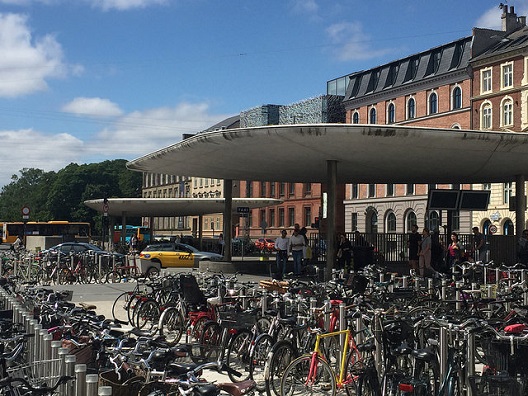An Escapologist’s Diary: Part 53. Copenhagen.

We’ve returned from a few days in Copenhagen, which seems to be a sort of Utopia.
There’s not much need for Escapology there. Work is apparently pleasant and minimal. The State seems to look after people instead of oppress and frustrate them. The culture seems liberal, expansive and geared toward trust, leisure and happiness.
The official working week in Denmark is 37 hours, already one of the shortest in Europe. But calculations from Statistic Denmark suggest that Danes actually work an average of just 34 hours a week. Employees are entitles to five weeks’ paid holiday a year, as well as thirteen days off for public holidays. This means that Danes actually only work an average of 18.5 days a month.
I’m now trying to make sense of what we saw by reading The Year of Living Danishly by Helen Russell. I remember that this book was very popular a couple of years ago. Yes, I’m aware that I’m late to the Hygge party.
Russell’s book is well-researched and entertaining so I’m scattering some choice quotes from it alongside my subjective observations and boring holiday snaps in this here diary entry.

It seems that one of their solutions to the good life is to let the State handle all of the stuff at the bottom of Maslow’s pyramid so that the people can get on with the self-actualising. Most Danes pay something like 37% income tax and a fairly steep VAT (consumption tax). It works. Remember (from New Escapologist Issue 3) that accumulated personal wealth beyond an income of £22,000 per year brings no further happiness, so why not give it up to benefit the whole?
They have an obscenely good quality of life. Yes, it’s expensive here. But it’s Denmark — it’s worth it. I don’t mind paying more for a coffee here because I know that it means that the person serving me doesn’t a) hate me or b) have a crappy life. Everyone is paid a decent wage, everyone is looked after, and everyone pays their taxes

In Copenhagen, everyone seems to ride around on bicycles, looking extremely stylish — often with a carefree cigarette hanging out of one side of the face.
biking is practically a religion here, no matter what your age or your occupation. Denmark is covered with over 7,500 miles of bike paths and Danes will cycle come rain or come hail. The government recently introduced their ‘National Cycling Strategy’ to get even more Danes on their bike. Danes are so bike-obsessed that you can even opt for a tricycle hearse to end the cycle of life. Half of all commuters in Copenhagen go to work by bike and Forbes magazine recently reported that cyclists save the city £20 million a year in avoided air pollution, accidents and congestion.

A few friends who had been there already said we’d “get bored of leggy blondes” and while the British eye will boggle at so many flaxen Nordic giraffes, it’s important to mention that Copenhagen doesn’t feel tediously white. I was surprised and delighted by the African and Middle Eastern influences. Headscarves and good food abound.

To be honest, by picking up The Year of Living Danishly, I was looking for downsides because it doesn’t seem very sophisticated to go around thinking that “everything is better in Denmark,” but while a few downsides are mentioned in the book (most of which are to some degree understandable), they’re not exactly the dark energy source I was looking for.
I’d been bracing myself to find a burbling battery of racism powering the nation or that they all worship an underground slug or something. But nope. I think it’s just a good place to live.

Once they’ve had children, 78 per cent of Danish mothers return to work. This is because childcare is subsidized by the government and the famed work-life balance of Danish workplaces makes it easier to balance career and family life here than it would be elsewhere. What has traditionally been defined as ‘women’s work’ is valued as highly as traditionally-defined ‘men’s work’ here — and both sexes do a bit of each.
On the street, the high quality of life is evident. In Darren McGarvey’s book, he describes what it was like to visit the affluent West End of Glasgow for the first time, having come from the rough-and-tough suburb of Pollock. He reports marveling at how violence didn’t seem to hang in the air and people seemed relaxed until he walked by in his tracksuit. Well, I live in the affluent West End of Glasgow and this was my equivalent; I was similarly taken aback by the palpable sense of collective happiness, satisfaction and pride.

We explored the city quite intensively during our limited time and my favourite place to spend time in was probably the Design Museum, which is where I was able to look at the endless loveliness of Danish design. Samara described me as being “in a froth” by the end of it, but I felt like I’d been through some wonderful therapy.
Make your environment as beautiful as you can. Danes do, and it engenders a respect for design, art and their everyday surroundings. Remember the broken window syndrome, where places that look uncared for just get worse? The reverse also applies.

Anyway, that’s enough blowing smoke up Denmark’s bottom. It’s a good place to live. But don’t move there please, as I think the small (5.5m) population is part of the key to their success. Instead, let’s import some of their ideas for living.(There’s a “top ten tips for living Danishly” in the back of the book, which are actually quite similar to New Escapologist‘s own Things of Value).
I thought I was doing all the right things to get to this point in my [London] life — working hard to be succesful and trying to please everyone. But I never seemed to succeed nearly enough to make all the effort worthwhile. I felt tired, hungry (often literally) and ephemeral, blown about by the currents of whatever was going on around me. But now I feel safe, secure and solid.
★That really good photo at the top of this post? I didn’t take that one. That’s the work of AJ.
Escape and Personal Responsibility
Is an issue as important as our immediate wellbeing something we can really afford to postpone until the government figures it out?
I’ve just finished reading Poverty Safari by Darren McGarvey (aka, Loki the Scottish Rapper). It’s good.
McGarvey shows us how poverty is a hostile environment from which it’s difficult but not impossible to escape. Escape, he says, lies in community engagement and personal responsibility.
He explains that personal responsibility is difficult when you live in poverty. The stress and lack of headspace that come with poverty serve to perpetuate your problems (which could include addiction, malnutrition, emotional problems, domestic abuse) so it’s difficult to gather escape velocity or even to recognize that such a thing might exist. Violence breeds violence, a fact tried and tested in Glasgow where I live and where McGarvey grew up.
He also explains that personal responsibility is “taboo” on the left. We’re supposed to think about systemic, not individualist, solutions. As you probably know, the scale and complexity of this challenge is alienating to the strongest and freest of us let alone those trying to escape poverty. (McGarvey’s acknowledgement and exploration of this issue did not stop a finger-wagging reviewer from making the standard charges against him in the LRB, which was ironically what prompted me to read this book).
He writes:
Eradicating poverty would require a global political consensus of the sort we have never seen. One day it will happen, but it’s not going to be today. Or tomorrow. […] This is not a submission; this is to acknowledge the complexity of the matter.
and:
Aspiring to take responsibility is not about giving an unjust system a free pass; it’s about recognising that we are part of that system and are, on some level, complicit in the dysfunction.
and crucially:
By encouraging people to believe that their immediate problems are beyond their own expertise, the very agency poverty deprives them of is denied.
I tried to explain in my own book that accepting personal responsibility for your escape does not make you a bad leftie. If you read my book and sense hesitation in my voice, it’s because I’m all too aware that I’m middle-class (albeit a recent arrival) and concerned that to champion personal responsibility might overlook the challenges — largely not experienced by me — of those in poverty. What McGarvey gives us now is the same sort of suggestion but from the working-class, poverty-experienced perspective. Thank Christ. This is part of what makes the book so good and so worthy of its winning this year’s Orwell Prize. Read it and weep.
You don’t need an agency or a charity to parachute in and tell you what to do. It doesn’t cost a penny and you can begin right away.



